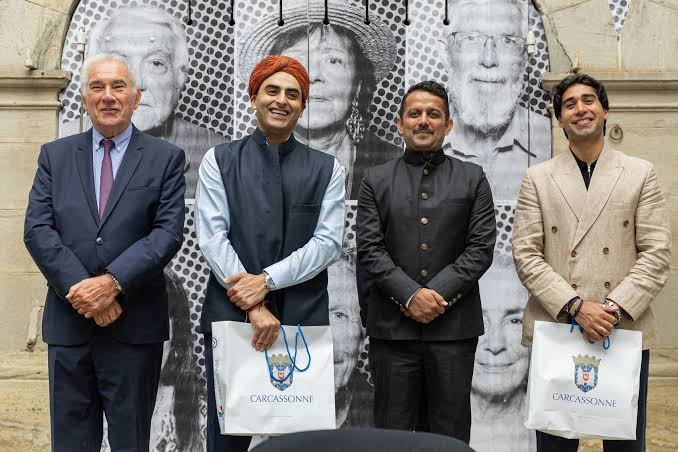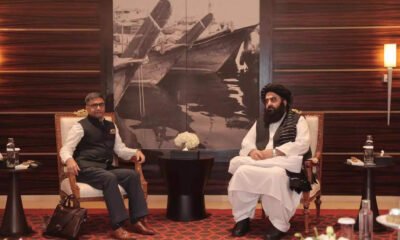Travel Guides & Articles
Why does Taliban minister need UN approval to visit India? – Firstpost

Afghanistan’s acting Foreign Minister Amir Khan Muttaqi, was preparing to travel to India this month in what would have been a landmark visit since the Taliban took over Kabul in August 2021.
The visit has now been postponed due to a technical yet significant hurdle: the travel ban imposed on Muttaqi and other senior Taliban leaders by the United Nations Security Council (UNSC).
The planned visit was expected to mark the first time a senior Taliban minister would officially visit India since the collapse of the previous Afghan government led by Ashraf Ghani.
According to officials familiar with the matter, discussions over the visit had been underway for several weeks. In late August, dates were tentatively explored for the trip, but they eventually did not materialise due to procedural hurdles.
Muttaqi, who has been under a UN-imposed travel ban since the Taliban came to power, needed formal approval from the Security Council to leave Afghanistan.
Without this waiver, he could not legally travel to India or any other country. When the exemption failed to come through, the visit had to be called off.
Diplomatic sources indicate that India continues to maintain direct communication with the Taliban and has not abandoned the idea of hosting Muttaqi.
Efforts are ongoing to reschedule the visit once the UN committee handling sanctions issues agrees to allow him to travel.
Why Muttaqi was denied UN approval to visit India
The need for a waiver stems from a strict sanctions framework managed by the UN Security Council. The 1988 Sanctions Committee is tasked with overseeing measures related to Taliban figures and entities.
These measures include travel bans, asset freezes, and arms embargoes aimed at preventing sanctioned individuals from gaining resources or mobility that could destabilise Afghanistan or the broader region.
The committee operates by consensus, meaning that any of the 15 member countries can block a request by raising an objection. This gives every member a form of veto power over decisions such as granting travel exemptions.
Currently,
Pakistan chairs the 1988 Sanctions Committee, giving it a pivotal role in shaping the committee’s actions.
According to individuals aware of the developments, Pakistan opposed the request for Muttaqi’s travel to India, effectively preventing the waiver from being approved.
This is not the first time
Muttaqi has faced such an obstacle.
His planned visit to Pakistan earlier this year was similarly cancelled after the United States reportedly objected to a waiver.
How the UN Sanctions regime works
The current sanctions regime is the product of several UN resolutions over the past two decades. The original framework was established in 1999 under Resolution 1267, primarily targeting Al-Qaeda, the Taliban and related groups.
Over time, the framework evolved through subsequent resolutions such as 1989 (2011) and 2253 (2015).
Today, the 1988 Sanctions Committee focuses specifically on Taliban-related issues, while another committee under Resolution 1267 deals with Al-Qaeda, ISIS and associated organisations.
Together, these bodies maintain and update the UN’s consolidated sanctions list, ensuring that designated individuals and entities face restrictions globally.
Sanctions are designed to disrupt financial flows, limit international travel, and weaken the logistical networks of those on the list.
For senior Taliban leaders, this means that foreign trips are highly regulated and can only occur if a waiver is granted for specific diplomatic or humanitarian purposes.
How India has approached Taliban 2.0
India has historically had deep ties with Afghanistan, including strong cultural connections and a record of developmental cooperation.
Over the years, India has invested in over 500 projects in Afghanistan, spanning infrastructure, healthcare, education and other critical sectors.
The
situation changed dramatically in August 2021, when the Taliban seized power following the withdrawal of US and Nato forces. Amid the rapid deterioration of security, India carried out a large-scale evacuation of its personnel and citizens.
This effort, known as Operation Devi Shakti, included the complete closure of India’s consulates and, eventually, the evacuation of its embassy in Kabul on August 17, 2021.
Despite these setbacks, India was quick to reestablish a presence in Afghanistan. In June 2022, the embassy was reopened with a reduced staff to facilitate humanitarian aid and oversee development initiatives.
This move was widely seen as a signal of
India’s intention to remain engaged with Afghanistan even under Taliban rule.
Since the Taliban takeover, Afghanistan has faced severe humanitarian challenges, including widespread food insecurity and economic collapse. India has been a major contributor to international relief efforts.
In December 2021, India began sending aid shipments, including wheat and essential medicines, through arrangements coordinated with the World Health Organisation and other international partners.
The Taliban takeover triggered a wave of refugees seeking safety abroad, including in India. According to UN figures, India hosts around 16,000 documented Afghan refugees, with an estimated 18,000 more living without official documentation.
In response to the crisis, India created a special visa category to fast-track applications for Afghans wishing to relocate.
How India-Taliban have been growing closer
India’s engagement with the Taliban has grown steadily in recent months, with a clear focus on maintaining dialogue while avoiding formal recognition of the regime.
In January, Indian Foreign Secretary Vikram Misri
held an important meeting with Amir Khan Muttaqi in Dubai. According to a statement issued by India’s Ministry of External Affairs, Misri conveyed that India would consider expanding its development projects in Afghanistan beyond the existing humanitarian programmes.
The two sides also discussed the potential for Afghan businesses to use Iran’s Chabahar port to boost trade, offering an alternative route to traditional pathways through Pakistan.
External Affairs Minister S Jaishankar has also been personally involved in these interactions. He spoke with Muttaqi by phone in May, marking the highest level of contact between the two governments since 2021.
The two leaders
spoke again on September 1, shortly after India sent aid to earthquake-hit areas in Afghanistan.
While Muttaqi’s visit to New Delhi has been postponed, it has not been permanently cancelled.
India is expected to formally approach the UN Security Council to request a waiver at the appropriate time.
External Affairs Ministry spokesperson Randhir Jaiswal, when asked about the matter at a press briefing, refrained from giving specifics but reiterated India’s broader position.
“As you are aware, we have longstanding ties with the people of Afghanistan. India continues to support the aspirations and developmental needs of the Afghan people. We continue to have engagements with Afghan authorities. If there is an update on this account, we will share it with you.”
The Taliban leadership has openly expressed its desire for stronger bilateral relations.
The Afghan regime have also repeatedly assured India that its territory will not be used by Pakistan-based terror groups to carry out attacks. This commitment was reiterated earlier this year when the Taliban condemned
the Pahalgam terror attack in India.
By deepening contacts with the Taliban, India aims to secure its own interests in Afghanistan while countering the influence of other regional powers, particularly Pakistan and China.
With inputs from agencies
Travel Guides & Articles
Courchevel to bring the French Alps to India with four-city roadshow

Courchevel is set to showcase its world of alpine luxury to India through an exclusive four-city roadshow in collaboration with One Rep Global.
The highly anticipated showcase will begin in Bangalore on September 15, travel to Ahmedabad on September 16, continue to New Delhi on September 18, and conclude in Mumbai on September 19.
Over the course of the week, India’s leading luxury travel advisors and trade professionals will be introduced to Courchevel’s finest experiences—from world-class skiing on the slopes of Les 3 Vallées and Michelin-starred gastronomy to luxury chalets, alpine events, and the cultural richness that has long defined Courchevel as a global luxury destination.
Alexia Laine, Director, Courchevel Tourisme, shared, “India is an incredibly important market for us, and we are delighted to return with a stronger presence across four key cities. Courchevel offers an unmatched combination of thrilling alpine adventure and world-class luxury. For Indian travellers seeking refined experiences with a touch of cultural authenticity, Courchevel represents the very best of the French Alps.”
The roadshow is being curated by One Rep Global, India’s leading sales and marketing representation company for luxury hospitality and travel.
Hemant Mediratta, Founder & CEO of One Rep Global, said, “At One Rep Global, we are committed to connecting India’s discerning travellers with the world’s most exceptional destinations. Courchevel is a perfect example of luxury that goes beyond indulgence—it is about experiences, authenticity, and connections. This roadshow provides an invaluable opportunity for India’s luxury travel community to engage deeply with the destination.”
Loveleen Arun, Advisory Board Member of One Rep Global and Founder of Panache World, commented, “Indian travellers today are evolving rapidly in their preferences—they want destinations that not only deliver luxury but also embody a sense of place and uniqueness. Courchevel offers exactly this—a rare harmony of elegance, culture, gastronomy, and adventure. We are delighted to be a part of this initiative to bring Courchevel closer to the Indian market.”
With its timeless allure, Courchevel continues to define haute montagne living, where glamour, gastronomy, and alpine adventure come together. Celebrating 80 years of setting the standard for luxury alpine experiences, 2026 marks a special milestone in Courchevel’s storied history. This exclusive roadshow is a gateway for Indian travellers to discover why Courchevel remains one of the world’s most coveted luxury destinations.
Travel Guides & Articles
India expands fast track immigration program to 13 airports, streamlining travel for citizens and OCI holders | India News

Launching the ‘fast track immigration – trusted traveller program’ (FTI-TTP) — which enables faster immigration of pre-verified flyers through automated e-gates — at five more international airports in the country, home minister Amit Shah on Thursday suggested that its coverage be maximised by enabling resident Indians and overseas citizens of India (OCI) to sign up for FTI-TTP at the state of issuing of passports or OCI cards itself.With the inclusion of Lucknow, Amritsar, Thiruvananthapuram, Tiruchirappalli and Kozhikode international airports, the total number of airports covered under the program has risen to 13. First launched at the Indira Gandhi International Airport here in June 2022, the program had added seven more airports — covering Mumbai, Chennai, Kolkata, Bengaluru, Hyderabad, Kochi and Ahmedabad — in January this year. Shah said the facility will be available at the upcoming Navi Mumbai and Jewar airports as well. Addressing the FTI-TTP inauguration event at five airports through video-conference, Shah said around 3 lakh persons had registered under the program and over 2.6 lakh travellers, both inbound and outbound, had availed of it, enabling them to clear immigration in as little as 30 seconds and with no long queues or manual checks. “The next phase of the effort to enhance passenger convenience by integrating Prime Minister Shri Narendra Modi Ji’s vision of ‘speed, scale, and scope’ into the FTI-TTP is starting from today,” he said, adding that the program introduces foreign travellers to the positive changes taking place in India. Drawing attention to the 60% increase in international passenger traffic over the past 11 years of Modi govt — from a little over 5 crore in 2014 to 8.1 crore in 2024 — Shah said the figure of 2.6 lakh who have availed of the FTI-TTP facility is too small, leaving tremendous scope to maximise its coverage. Stating that everyone who has availed of the program has voiced appreciation, the home minister said “our goal should be to ensure that every Indian citizen and every OCI cardholder takes advantage of this facility”.“To achieve this, I request that when issuing passports and OCI cards, we can also conduct this registration (under FTI-TTP), so that people don’t have to come twice for fingerprinting or document verification. Whenever they travel, they can simply use their passport. I think we must further explore the technological possibilities to maximize the number of people who can take advantage of this program,” he added.
Travel Guides & Articles
France’s Carcassonne, Jaisalmer form historic twin city alliance

Carcassonne & Jaisalmer form historic twin alliance
In a significant cultural development, the medieval French city of Carcassonne in Occitanie has officially been twinned with Jaisalmer in Rajasthan. The agreement, finalised on 30 August 2025, crowns more than four years of exchanges and relationship-building between the two cities. Both municipalities are celebrated for their imposing fortresses overlooking the town, a shared feature that has earned Jaisalmer the affectionate nickname “Carcassonne of the desert.”
The origins of this initiative date back to February 2021, when a France 2 news report filmed in India captured the Maharaja of Jaisalmer expressing admiration for Carcassonne and his wish to build closer ties. Inspired by these words, Jaisalmer representatives highlighted the architectural and cultural parallels between the two destinations, sparking discussions that gradually evolved into formal cooperation.
Over the years, delegations from both sides engaged in multiple visits and exchanges. These efforts culminated in the signing of the twinning pact this August, establishing a structured framework for collaboration. The agreement strengthens cooperation in tourism, heritage conservation, arts, culture, and sports, with joint committees and working groups set to coordinate future initiatives.
The twinning with Jaisalmer becomes Carcassonne’s fourth international partnership, following earlier alliances with Eggenfelden in Germany (1973), Baeza in Spain (2012), and Tallinn in Estonia (2013). To celebrate the milestone, Carcassonne will install new signs at all city entrances listing its four twin cities along with the official dates of each union.
For Rajasthan, this is the second landmark cultural partnership with France. The City Palace of Udaipur had earlier been twinned with the Château de Chambord in the Loire Valley, creating avenues for cross-cultural dialogue and tourism promotion. The addition of Jaisalmer–Carcassonne deepens these links, reinforcing Rajasthan’s role as a bridge between Indian and European heritage.
This new partnership is expected to enhance cultural diplomacy, expand tourism opportunities, and foster people-to-people connections between the desert city of India and the fortress town of France. By blending shared history with future collaboration, Jaisalmer and Carcassonne are set to write a new chapter in international heritage cooperation.
-

 Business2 weeks ago
Business2 weeks agoThe Guardian view on Trump and the Fed: independence is no substitute for accountability | Editorial
-
Tools & Platforms1 month ago
Building Trust in Military AI Starts with Opening the Black Box – War on the Rocks
-

 Ethics & Policy2 months ago
Ethics & Policy2 months agoSDAIA Supports Saudi Arabia’s Leadership in Shaping Global AI Ethics, Policy, and Research – وكالة الأنباء السعودية
-

 Events & Conferences4 months ago
Events & Conferences4 months agoJourney to 1000 models: Scaling Instagram’s recommendation system
-

 Jobs & Careers2 months ago
Jobs & Careers2 months agoMumbai-based Perplexity Alternative Has 60k+ Users Without Funding
-

 Podcasts & Talks2 months ago
Podcasts & Talks2 months agoHappy 4th of July! 🎆 Made with Veo 3 in Gemini
-

 Education2 months ago
Education2 months agoVEX Robotics launches AI-powered classroom robotics system
-

 Education2 months ago
Education2 months agoMacron says UK and France have duty to tackle illegal migration ‘with humanity, solidarity and firmness’ – UK politics live | Politics
-

 Funding & Business2 months ago
Funding & Business2 months agoKayak and Expedia race to build AI travel agents that turn social posts into itineraries
-

 Podcasts & Talks2 months ago
Podcasts & Talks2 months agoOpenAI 🤝 @teamganassi





















